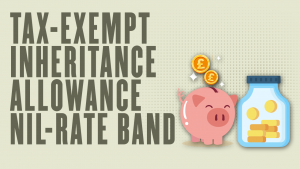In April 2023, the latest data from HMRC reveals that inheritance tax collections reached £600 million, marking a £100 million surge compared to the previous tax year.
Due to years of escalating property prices, surging inflation, and stagnant tax thresholds, a growing number of households, not perceiving themselves as affluent, have surpassed the inheritance tax threshold.
 A tax-exempt inheritance allowance, known as the nil-rate band, applies to all individuals. Each person can transfer assets worth up to £325,000 from their estate without incurring any inheritance tax liability. Amounts exceeding £325,000 may be subjected to a maximum of 40% inheritance tax. The nil-rate band has remained unchanged since April 2009, resulting in a 32.8% decrease in its real value due to inflation, while average property prices have risen by nearly 85%.
A tax-exempt inheritance allowance, known as the nil-rate band, applies to all individuals. Each person can transfer assets worth up to £325,000 from their estate without incurring any inheritance tax liability. Amounts exceeding £325,000 may be subjected to a maximum of 40% inheritance tax. The nil-rate band has remained unchanged since April 2009, resulting in a 32.8% decrease in its real value due to inflation, while average property prices have risen by nearly 85%.
Certain homeowners may also reap the advantages of an additional ‘residence nil-rate band’ of up to £175,000, in addition to the standard nil-rate band. However, this provision solely applies when bequeathing one’s primary residence to a direct heir. Since April 2020, the ‘residence nil-rate band’ has remained fixed at £175,000.
It appears that the forthcoming tax year, 2023/24, is poised to break yet another record for inheritance tax, solidifying its status as a lucrative source of revenue for HMRC.
Speculations have arisen regarding potential reductions in inheritance tax in the lead-up to the next General Election. The government might consider raising the threshold at which an estate becomes subject to inheritance tax or possibly reducing the headline tax rate. Such changes would be warmly welcomed by numerous well-off households, falling short of being ultra-wealthy, who bear the brunt of this widely despised tax.
Nonetheless, in certain circles, inheritance tax is already dubbed the “voluntary tax” due to the considerable scope for avoidance or mitigation through government-endorsed investment schemes and astute tax planning. Drafting a will serves as a prudent initial step, as failure to do so would result in assets being distributed according to intestacy rules, potentially attracting inheritance tax that could otherwise be circumvented.
Individuals with concerns regarding inheritance tax should also take into account the following considerations:
- Opting to give money as gifts early on can be advantageous. Gifts made from regular income that do not impact the giver’s standard of living are exempt from inheritance tax from the outset. Similarly, certain smaller gifts are also tax-free. However, timing is crucial, as it typically takes seven years for such gifts to become entirely exempt from inheritance tax. It is important to note that once the money is given away, control over it is relinquished. Retrieving it for emergencies is not an option.
- Investing in companies eligible for Business Property Relief (BPR) is another avenue to explore. These companies typically become exempt from inheritance tax after two years. It is worth noting that investing in unquoted businesses carries its own risks, but unlike gifting money, you retain control over the investment.
- Considering an AIM (Alternative Investment Market) ISA for investment purposes is another option. Traditional ISAs are not exempt from inheritance tax, which means that upon passing away, your loved ones could potentially lose up to 40% of your hard-earned funds. AIM ISAs, though riskier, can provide a solution to this issue. After two years of holding an AIM ISA, it could potentially be free from inheritance tax.
* Wealth Club’s Chief Executive and Founder, Alex Davies, provided these insights. *
